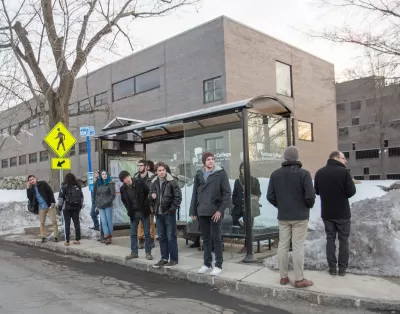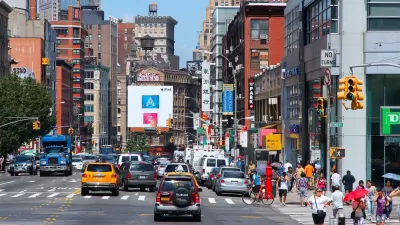Transit is not providing what many travelers need, in terms of both location and service. The result is that transit use is a time and financial burden for those who can least afford it.

Joseph P. Williams takes a closer look at the challenges of commuting by transit, particularly for low-income riders and those traveling from areas where service is lacking. Transit can be a time-consuming and costly mode for people who have difficulty accessing it or are dependent on unreliable systems.
Williams draws from his own experience when he found himself several years ago unemployed and living without a car in an upscale suburb of Washington, D.C., where buses only ran twice an hour and were often not on schedule. "Besides fighting through the common frustrations every commuter experiences, riders from transit deserts must deal with the aggravation of possibly missing the bus and enduring a long wait for the next one," says Williams.
He adds that transit systems in cities such as Washington, D.C., and New York are in dire need of maintenance, and ridership has dropped as service quality has decreased. "People who can afford to are voting with their wallets: buying cars, using alternative transportation services like Uber, or moving closer to the city to cut down on their commutes, in the process driving up housing costs and adding to traffic congestion," notes Williams.
But many transit-dependent riders cannot make such shifts, and fare increases and service cuts make transit use even more difficult. "Those twin costs of time and money add up across the income spectrum: White-collar workers like [Carrie] Blough have to run faster and longer just to stay in place, while [Karen] Allen and other hourly-wage employees who want to get ahead have to fight against bigger financial and logistical burdens," writes Williams.
FULL STORY: In an Unequal America, Getting to Work Can Be Hell

Maui's Vacation Rental Debate Turns Ugly
Verbal attacks, misinformation campaigns and fistfights plague a high-stakes debate to convert thousands of vacation rentals into long-term housing.

Planetizen Federal Action Tracker
A weekly monitor of how Trump’s orders and actions are impacting planners and planning in America.

In Urban Planning, AI Prompting Could be the New Design Thinking
Creativity has long been key to great urban design. What if we see AI as our new creative partner?

King County Supportive Housing Program Offers Hope for Unhoused Residents
The county is taking a ‘Housing First’ approach that prioritizes getting people into housing, then offering wraparound supportive services.

Researchers Use AI to Get Clearer Picture of US Housing
Analysts are using artificial intelligence to supercharge their research by allowing them to comb through data faster. Though these AI tools can be error prone, they save time and housing researchers are optimistic about the future.

Making Shared Micromobility More Inclusive
Cities and shared mobility system operators can do more to include people with disabilities in planning and operations, per a new report.
Urban Design for Planners 1: Software Tools
This six-course series explores essential urban design concepts using open source software and equips planners with the tools they need to participate fully in the urban design process.
Planning for Universal Design
Learn the tools for implementing Universal Design in planning regulations.
planning NEXT
Appalachian Highlands Housing Partners
Mpact (founded as Rail~Volution)
City of Camden Redevelopment Agency
City of Astoria
City of Portland
City of Laramie





























